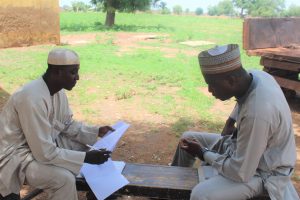
dRPC was engaged by the Action Aid Nigeria as Third-party Monitor (TPM) to monitor the implementation of three programme areas of N-SIP (The Government Enterprise Empowerment Programme (GEEP), Home Grown School Feeding Programme and Job Creation Programme (N-Power)), in Kano state in collaboration with 3 Community-based Organisations: Federation of Muslim Women’s Association of Nigeria (FOMWAN); Neighbourhood Education Committee (NEDF); and Friends of the Community Organisation (FOCO).
The aim of the third party monitoring exercise is to monitor and evaluate the outputs and outcomes of the implementation of the N-SIP. It is aimed at capturing beneficiaries’ voice and providing feedback to the NSIO with the aim of improving the delivery of services in the programme.
The objectives of Third-party Monitoring of the N-SIP are to:
- Facilitate deeper understanding amongst the populace of the N-SIP contribution to eradicating poverty and reducing inequality in Nigeria.
- Support to the NSIO process of a monitoring system for the N-SIP in the 36 states and FCT.
- Establish the civil society process of an independent citizens’ monitoring system for the N-SIP in selected locations.
- Strengthen the capacity of CSOs to monitor the N-SIP and advocate to government on the N-SIP process in the project states.
- Engage with social investment service recipients and other citizens to share their experience and perspectives of the N-SIP and mobilise them on how they can actively participate and give feedback in the program in the project states.
- Support the process of a CSO Situation Room on SIP (CSR-SIP) that would engage with the NSIO with processed information from the service recipients and other citizens, through the CSR-SIP Steering Committee;
- Generate of additional information to grow knowledge in the field of social investment and social protection;
- Support the work of MDAs and government in ensuring the success of the N-SIP;
- Support accountability processes and commitments of the Government to Nigerians;
- Feed into the impact assessment of the N-SIP on target beneficiaries and reduction of poverty in Nigeria.

The Third-party monitoring exercise will be conducted in some selected LGAs in Kano.
| SENATORIAL DISTRICTS | LOCAL GOVERNMENTAREA (LGAs) | |
| KANO SENATORIAL ZONE | 1. | Dala |
| 2. | Gwale | |
| 3. | Kumbotso | |
| 4. | Tarauni | |
| 5. | Kano Municipal | |
| 6. | Minjibir | |
| 7. | Nassarawa | |
| 8. | Ungogo | |
| KANO NORTH SENATORIAL ZONE | 9. | Bichi |
| 10. | Danbatta | |
| 11. | Gwarzo | |
| 12. | Kabo | |
| 13. | Karaye | |
| KANO SOUTH SENATORIAL ZONE | 14. | Gaya |
| 15. | Rano | |
| 16. | Ajingi | |
| 17. | Wudil | |
| 18. | Sumaila |
The major tasks of the dRPC as TPM are:
- Investigate the accessibility of services by beneficiaries for the three programme areas to be monitored.
- Verify the number of people that have benefitted from the three programme areas.
- Capture any positive outcomes from the three programme areas.
- Capture any negative outcomes as a result of the implementation of the three programme areas.
- Capture challenges faced by both the service operators and beneficiaries in the delivery of the three programme areas.
- Capture success stories from beneficiaries and community members from the three programme areas to be monitored;
- Support NSIO and relevant implementing agencies in identifying and dealing with issues on time as they occur in the programme;
- Capture feedback or any evidence of corrupt practices under the programme for example beneficiaries being asked to pay bribes to access services ;
- Provide feedback to AAN on key findings from the monitoring exercise.

